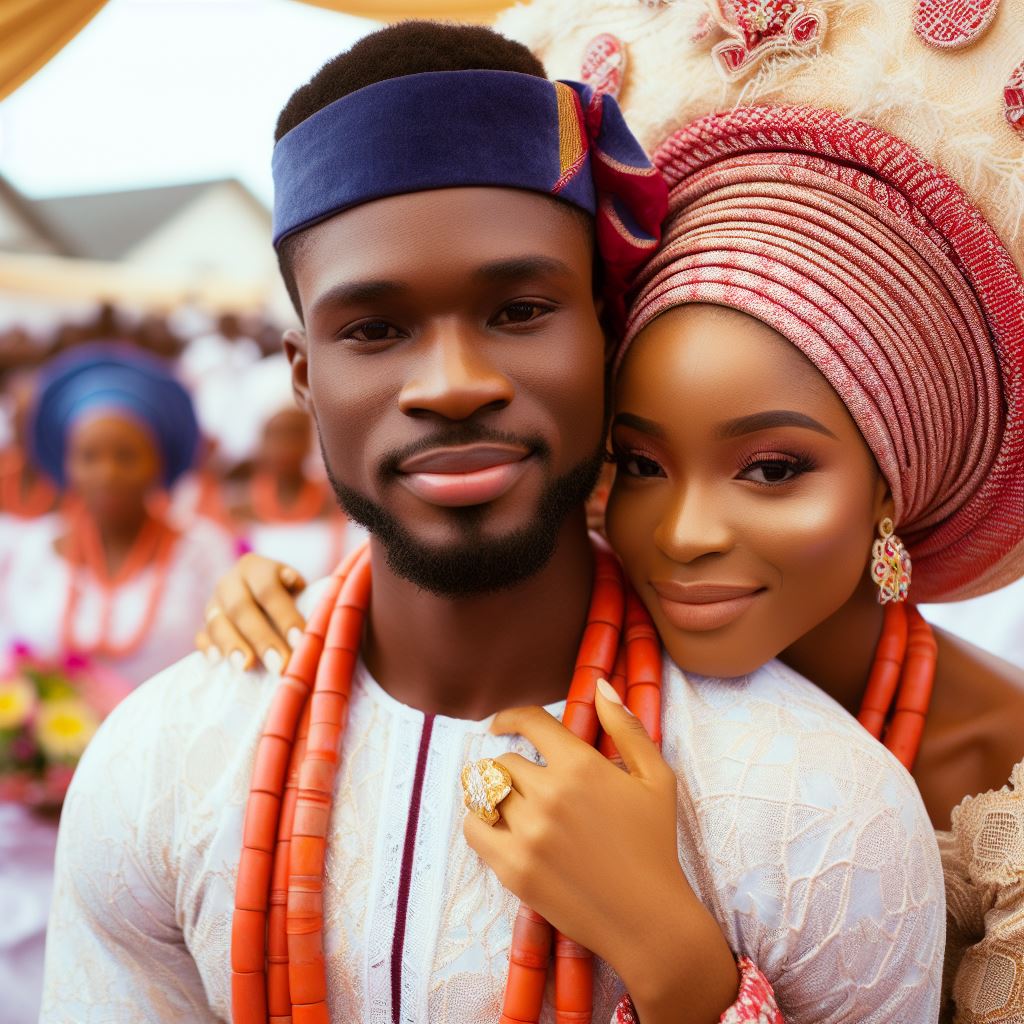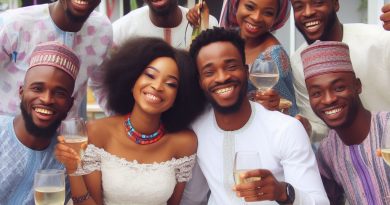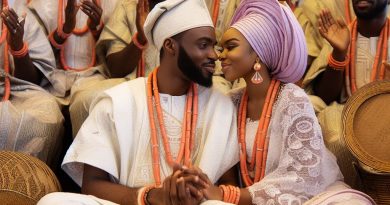Blending Cultures: Intertribal Marriage Challenges
Last Updated on October 28, 2023
Introduction
Intertribal marriage involves unions between individuals from different Native American tribes, promoting cultural exchange and acceptance. However, it also presents challenges.
Challenges
- Clash of customs, traditions, and values can lead to conflicts.
- Language barriers may hinder effective communication.
- Different approaches to communication can cause misinterpretations.
- Open-mindedness, respect, and a willingness to learn are essential.
- Embracing diversity within Native American cultures enriches intertribal marriages.
Exploring these challenges and finding common ground can strengthen intertribal marriages and harmoniously blend cultures.
Understanding Intertribal Marriage
Definition and scope
Intertribal marriage refers to the union between individuals from different ethnic groups within a country.
It involves couples belonging to distinct tribes, bringing together diverse cultural and traditional backgrounds.
These marriages challenge societal norms, as they pose unique obstacles that need to be addressed.
Cultural diversity in Nigeria and its impact on marriages
Nigeria is a country known for its rich cultural diversity, with over 250 ethnic groups residing within its borders.
This cultural heterogeneity influences intertribal marriages, as couples have to navigate through varying customs, languages, and traditions.
Such diversities affect their marital dynamics and require open-mindedness and flexibility.
Language barrier
Different tribes in Nigeria have distinct languages, which can pose communication challenges for intertribal couples.
- Linguistic compatibility becomes crucial as the couple strives to understand each other’s language.
- Learning both languages can promote cultural appreciation and improve overall communication within the marriage.
Traditions and customs
Each tribe in Nigeria possesses unique traditions and customs that shape their way of life.
- Intertribal couples often encounter conflicts when these traditions clash, requiring compromise and understanding.
- Understanding and respecting each other’s customs can foster a sense of acceptance, strengthening the marital bond.
Religious differences
Nigeria is divided into various religious groups, including Christianity, Islam, and traditional religions.
- Intertribal marriages may face challenges due to different religious beliefs, practices, and obligations.
- Respect for each other’s faith and finding common ground can help build a harmonious spiritual foundation.
Factors contributing to the increase in intertribal marriages
Over the years, intertribal marriages in Nigeria have been on the rise, influenced by several factors.
Urbanization and globalization
The shift towards urban areas and exposure to diverse cultures through globalization have fostered intertribal interactions.
- Urban centers act as melting pots of different ethnicities, increasing the chances of intertribal couples meeting and forming relationships.
- Increased exposure to different cultures expands individuals’ perspectives and promotes acceptance of intertribal marriages.
Education and career opportunities
Access to education and career opportunities beyond tribal boundaries has contributed to the rise in intertribal marriages.
- As individuals pursue education and career paths, they interact with people from diverse backgrounds, forming relationships based on common interests rather than tribal affiliations.
- Education promotes cultural understanding and acceptance, leading to intertribal marriages becoming more prevalent.
Enhanced communication and transportation
Advanced communication technology and improved transportation systems have made it easier for individuals from different tribes to connect.
- Long-distance relationships have become more manageable, allowing individuals to bridge geographical gaps and maintain intertribal unions.
- Increased accessibility strengthens intertribal marriages by facilitating regular communication and minimizing physical separation.
In short, intertribal marriages in Nigeria offer a unique blend of cultures, but they also bring challenges that require mutual respect, understanding, and compromise.
The country’s cultural diversity impacts these marriages, but factors like urbanization, education, and improved communication contribute to their increase.
Embracing these challenges and embracing cultural diversity can lead to stronger and more fulfilling intertribal marriages.
Read: Interviews & Documentation: Preparing for the Citizenship Process
Challenges Faced in Intertribal Marriages
Language and communication barriers
Intertribal marriages often necessitate overcoming language and communication challenges due to diverse native languages.
Differences in customs, traditions, and practices
Cultural disparities can create hurdles as couples navigate different customs, traditions, and practices within their respective tribes.
Resistance from family and community members
Intertribal marriages may face opposition and resistance from family members and community due to cultural preservation concerns.
Religious differences
Diverse spiritual beliefs and practices can pose difficulties for intertribal couples seeking to merge their religious traditions.
Different expectations and values regarding gender roles
Differing gender expectations and values between tribes can result in conflicting views on roles and responsibilities within the marriage.
Adjusting to new socio-economic realities
Intertribal marriages may require adapting to varying socio-economic conditions, which can pose challenges for individuals accustomed to different lifestyles.
Navigating conflicting holidays and celebrations
Intertribal couples encounter numerous challenges:
- Language barriers hinder effective communication.
- Customs and traditions may clash.
- Resistance from families and communities.
- Religious differences must be harmonized.
- Divergent gender roles and expectations.
- Socio-economic disparities require adaptation.
- Navigating conflicting holidays and celebrations.
Addressing these challenges demands open-mindedness, compromise, and cultural appreciation.
Couples can create a thriving blended culture by embracing diversity.
Read: Love and Law: Balancing Marriage and Citizenship Goals

Strategies for Overcoming Intertribal Marriage Challenges
Open and honest communication
One of the most crucial strategies for overcoming intertribal marriage challenges is to maintain open and honest communication.
By openly discussing cultural differences, expectations, and concerns, couples can foster understanding and find common ground.
It is important to create a safe space where both partners can express their feelings and be willing to listen to each other.
Embracing compromise and flexibility
Intertribal marriages require a willingness to embrace compromise and flexibility.
Through compromise, couples can find ways to blend their traditions and values while respecting each other’s cultural heritage.
Finding a middle ground and being open to new experiences can strengthen the bond between partners.
Seeking external support and counseling
Seeking external support and counseling can be immensely helpful in navigating intertribal marriage challenges.
A professional counselor or therapist can provide guidance and help couples work through conflicts in a healthy and constructive manner.
They can also offer insights into cultural differences and provide tools for effective communication.
Encouraging cultural education and understanding
Encouraging cultural education and understanding is vital for intertribal couples.
By learning about each other’s cultures, traditions, and customs, couples can develop a deeper appreciation and respect for their partner’s background.
This can also help them navigate potential conflicts arising from cultural differences more effectively.
Building strong support networks
Building strong support networks is essential for intertribal couples.
Connecting with other intertribal couples or individuals who have faced similar challenges can provide a sense of belonging and understanding.
These support networks can offer advice, empathy, and encouragement, and serve as a source of strength during difficult times.
Fostering mutual respect and appreciation
One of the cornerstones of a successful intertribal marriage is fostering mutual respect and appreciation.
Each partner should value and honor the other’s heritage, traditions, and beliefs.
By showing respect for each other’s backgrounds, couples can create a strong foundation for their relationship.
In fact, intertribal marriages may face unique challenges, but by implementing these strategies, couples can overcome them and build a harmonious and enriching partnership.
Open and honest communication, embracing compromise, seeking external support, encouraging cultural education, building support networks, and fostering mutual respect are essential for a successful intertribal marriage.
It is through these strategies that couples can embrace their differences, celebrate their similarities, and create a thriving multicultural family.
Read: Marriage Fraud vs Genuine Relationships in Nigeria
Success Stories and Positive Outcomes
Sharing examples of successful intertribal marriages
- John and Sarah, from different tribes, have successfully merged their cultures to create a harmonious family.
- Mark and Maya’s marriage has flourished as they celebrate and honor both their tribal traditions.
- Lisa and David’s intertribal marriage has resulted in their children experiencing the richness of both cultures.
Benefits of blending cultures and traditions
- Blending cultures allows for a wider perspective, fostering tolerance and understanding among communities.
- Intertribal marriages promote diversity, breaking down stereotypes, and promoting unity within families and communities.
- The exchange of cultural practices and traditions in intertribal marriages strengthens the foundation of love and respect.
Potential for cultural enrichment and personal growth
Intertribal marriages broaden horizons and enrich lives:
- Exposure to new lifestyles and beliefs.
- Fostering personal growth and cultural awareness.
- Creating a unique cultural blend.
- Overcoming challenges and building thriving relationships.
Successful couples, like John and Sarah, Mark and Maya, and Lisa and David, embrace their diverse backgrounds.
They enrich their families and communities through tolerance, understanding, and the breaking down of stereotypes.
Intertribal marriages promote personal growth, widen horizons, and challenge preconceived notions, ultimately fostering unity, harmony, and a more inclusive society that celebrates diverse contributions.
Read: Protecting Your Rights in a Marriage-Based Citizenship Bid
Conclusion
Recap of challenges and strategies discussed
In this section, we have explored the challenges faced by couples in intertribal marriages.
These challenges include differences in language, traditions, and cultural expectations.
However, we have also discussed various strategies that can help intertribal couples navigate through these challenges, such as open communication, compromise, and respect for each other’s cultural backgrounds.
Emphasis on the importance of embracing intertribal marriages
It is crucial to understand that intertribal marriages can contribute to the rich diversity of our society.
By embracing these unions, we have the opportunity to foster cultural exchange, break down stereotypes, and promote unity among different tribes.
Intertribal marriages can serve as a bridge to connect people from diverse backgrounds and create a stronger and more inclusive society.
Encouragement for individuals in intertribal marriages
To all those in intertribal marriages, it is important to celebrate the uniqueness of your union.
Embrace the beauty of blending cultures, and be proud of the diversity you bring to your family and community.
Remember that challenges will arise, but with patience, understanding, and love, you can overcome them and build a strong bond that showcases the best of both worlds.
Closing thoughts and call to action for promoting cultural understanding and acceptance in Nigeria
As a society, we should actively promote cultural understanding and acceptance in Nigeria.
This starts with recognizing the value and significance of intertribal marriages.
Let us challenge our biases, celebrate diversity, and create an environment where all cultures are respected and appreciated.
Together, we can foster a society that celebrates unity in diversity.


